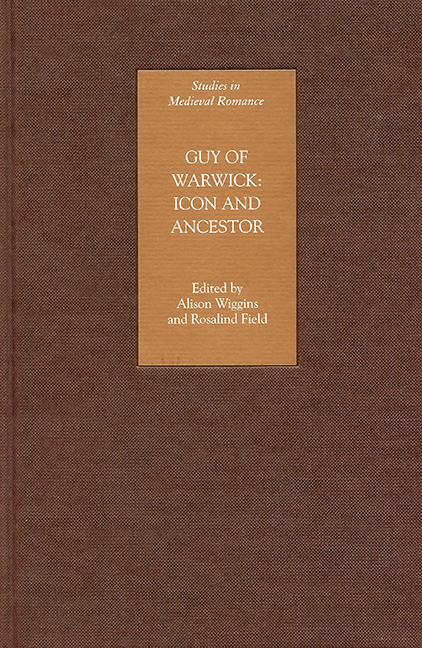Book contents
- Frontmatter
- Contents
- Illustrations
- Contributors
- Abbreviations
- Dedication
- Editorial Introduction: Namoore of this! How to read Guy of Warwick and why
- 1 Gui de Warewic at Home and Abroad: A Hero for Europe
- 2 Gui de Warewic in its Manuscript Context
- 3 Guy of Warwick as a Translation
- 4 From Gui to Guy: The Fashioning of a Popular Romance
- 5 The Manuscripts and Texts of the Middle English Guy of Warwick
- 6 The Speculum Guy de Warwick and Lydgate's Guy of Warwick: The Non-Romance Middle English Tradition
- 7 An Exemplary Life: Guy of Warwick as Medieval Culture-Hero
- 8 The Visual History of Guy of Warwick
- 9 ‘In her owne persone semly and bewteus’: Representing Women in Stories of Guy of Warwick
- 10 Of Dragons and Saracens: Guy and Bevis in Early Print Illustration
- 11 Guy of Warwick and The Faerie Queene, Book II: Chivalry Through the Ages
- 12 Guy as Early Modern English Hero
- Appendix: Synopsis of the Guy of Warwick narrative
- Index
9 - ‘In her owne persone semly and bewteus’: Representing Women in Stories of Guy of Warwick
Published online by Cambridge University Press: 24 October 2017
- Frontmatter
- Contents
- Illustrations
- Contributors
- Abbreviations
- Dedication
- Editorial Introduction: Namoore of this! How to read Guy of Warwick and why
- 1 Gui de Warewic at Home and Abroad: A Hero for Europe
- 2 Gui de Warewic in its Manuscript Context
- 3 Guy of Warwick as a Translation
- 4 From Gui to Guy: The Fashioning of a Popular Romance
- 5 The Manuscripts and Texts of the Middle English Guy of Warwick
- 6 The Speculum Guy de Warwick and Lydgate's Guy of Warwick: The Non-Romance Middle English Tradition
- 7 An Exemplary Life: Guy of Warwick as Medieval Culture-Hero
- 8 The Visual History of Guy of Warwick
- 9 ‘In her owne persone semly and bewteus’: Representing Women in Stories of Guy of Warwick
- 10 Of Dragons and Saracens: Guy and Bevis in Early Print Illustration
- 11 Guy of Warwick and The Faerie Queene, Book II: Chivalry Through the Ages
- 12 Guy as Early Modern English Hero
- Appendix: Synopsis of the Guy of Warwick narrative
- Index
Summary
The romances about Guy of Warwick focus mainly on his derring-do and heroic battles, while his wife, Felice, is described rather conventionally, as by John Lydgate: ‘In alle her tyme was holden noon so ffayre, Called ensaumple of truthe & womanhed’ (179–80). In Lydgate's poem, produced about 1442, Felice spends her time ‘wepyng nyght & day’ (176) after her son is kidnapped, and she dies promptly after Guy is buried, as she also does in the other Middle English versions of the tale, which typically portray the mature Felice as beautiful, passive, virtuous, and religious. Such a model might have been particularly appropriate for (and flattering to) Lydgate's patron, Margaret, the eldest daughter of Richard Beauchamp (1382–1439), Earl of Warwick, from his first marriage, for whom Lydgate composed ‘the lyffe of that moste / worthy knyght of Guy of Warrewyk of whos blode she is / lenyally descendid’.
This chapter examines the exemplary character of Felice as she appears in the fifteenth-century legends of Guy against the often difficult and demanding realities of the lives of women readers and patrons for whom these later legends were reshaped and retold. In its analysis of fifteenth-century texts made for or associated with members of the Beauchamp family, this chapter considers the later reception and appropriation of the Guy romances in order to explore more generally the influences of fiction, in this case romance, upon the larger historical record.
Among the primary sources to be discussed are texts commissioned by or written specifically for the Beauchamp family circle, including Lydgate's poem, the Irish Life of Sir Guy, composed before 1449, and the Rommant de Guy de Warwik of c. 1445, along with the undated ‘second or fifteenthcentury version’ of Guy of Warwick (Cambridge University Library MS Ff.2.38), which I argue contains previously unnoticed internal evidence of a Beauchamp connection. Stories of Guy and Felice are told as well in two of the most famous illustrated heraldic manuscripts of the fifteenth century.
- Type
- Chapter
- Information
- Guy of Warwick: Icon and Ancestor , pp. 133 - 153Publisher: Boydell & BrewerPrint publication year: 2007



